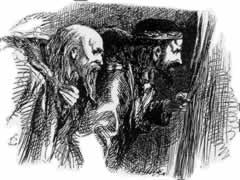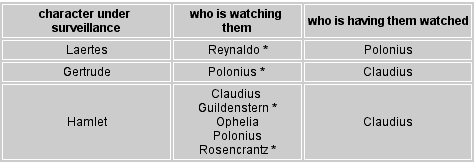![]()
Embodiments of Evil: Claudius and Polonius
According to H.D.F.Kitto, two evil men besmirch the entire kingdom of Denmark. The first of these is Claudius. Kitto projects the metaphor of poisoning from the ghost's speech on the process of the rest of the play. As in the ghost's description, Claudius continues to play the role of the poisoner.
| Claudius murders King Hamlet by poison; thereafter, a metaphorical poison seeps through the play: rottenness, cankers, 'things rank and gross in nature' meet us at every turn. Then at the end it once more becomes literal poison: Gertrude, Claudius, Laertes, Hamlet are all poisoned; and on Claudius, already dead or dying from the poisoned rapier, Hamlet forces the poisoned cup. - H.D.F. Kitto, Form and Meaning in Drama, Barnes and Noble, New York, 1956. pp.249-250. |
Second in command, and second in corruption is Polonius. Kitto ascribes to him the role of head of intelligence in the Danish state. He finds the functions of spying and double-dealing to be second nature to him.
|
Polonius gives Ophelia a book, evidently a holy book. Lying, spying, double-dealing, are second nature to the wise old counselor; even so, the formal indecency of what he is doing now makes him uneasy.
So, Polonius, there you are -- and there too is Claudius, who also confesses at this moment the rottenness of his soul. - Kitto. p251. |
Kitto's assessment of Polonius is that he may be "treacherous, crafty, insecure, disastrously wrong in judgment" (p.275); but he is also competent in his role under Claudius.

Jan Kott takes Kitto's view one step further. Being raised in the repressive
Communist regime of mid 20th-Century Poland, Kott is attuned to the police-state
quality of a Denmark in which everyone is under surveillance, and secret
spies are hired to watch even family members.
| Everybody, without exception, was being constantly watched. Polonius, minister to the royal murder, sends a man to France even after his own son... At Elsinore castle someone is hidden behind every curtain. The good minister does not even trust the Queen... Everything at Elsinore has been corroded by fear: marriage, love and friendship. Shakespeare, indeed, must have experienced terrible things at the time of Essex's plot and execution, since he came to learn so well the working of the Grand Mechanism. - Jan Kott, Shakespeare our Contemporary, Doubleday, New York, 1966. p.60. |
Here's a chart listing characters who are under surveillance at one time or another during the play. You can see from this chart who is being watched by whom, and at the behest of whom.

As might be expected, a plethora of productions following Shakespeare our Contemporary have made the paranoia that comes with functioning within a police state an operative theme. Franco Zeffirelli not only makes the constant surveillance in the court in Elsinore evident in his production, but he also uses it for exposition. Instead of including Ophelia's description of Hamlet's perusal of her face, Zefirelli shows us Polonius spying on Ophelia at the moment the events of her description take place.
In a similar vein, Hamlet is frequently depicted as knowing or suspecting that he is being spied upon during the "nunnery" scene when he breaks his line of conversation and asks Ophelia where her father is. An excellent example of such staging is seen in Tony Richardson's 1964 staging of Hamlet.
It is also true that Hamlet suspects that Rosencrantz and Guildenstern are commissioned to spy on him from the time of their arrival in Elsinore. He even extracts a confession from them regarding the purpose of their visit. (II,ii) We subsequently see that as the play progresses, his suspicions toward his two "friends" increases to a point where he has no trust for them at all.
|
There's letters seal'd, and my two schoolfellows, |